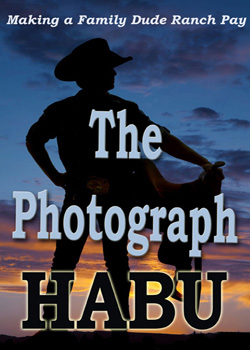Robust and commanding legendary adventure novelist J. Harvey Kincaid had been an important repeat lodger at the Wolf Creek dude ranch in the Colorado Rockies for decades, annually having come to be taken up into the mountains to hunt elk by both Jamie’s grandfather and Jamie’s father, John. With John off in Laramie, Wyoming, at a rodeo, and Jamie left behind to manage the financially struggling dude ranch, Kincaid has shown up again, asking young Jamie to take him on a hunting trip up into the mountains.
When straightening up the charismatic and “man’s man” novelist’s room, Jamie comes across a hunting trip photograph strongly hinting of a predatory hold Kincaid has had over his father, John—and that brings to mind the guilt-ridden suicide of his grandfather as well.
The revelation that Kincaid's trips have had a whole different connotation of hunting than shooting elk makes Jamie determined that Kincaid’s predatory hold over the previous two generations of his family and threatened extension to a third generation will come to an end on this camping trip up into the Rockies.
I had little idea how to track elk—that had been my father's specialty—but J. Harvey Kincaid was a patient man, a very patient man. We rode across the isolated ridges for days, searching near the tree lines, where Kincaid said my father often took him. By the third day our horses were worn out, and Kincaid suggested that we just lay by in a stand of cottonwood trees next to a fast-running stream in a sheltering ravine he remembered from previous trips.
We ate that night over an open fire, leaning against the saddles we had slung on the ground between the bank of the stream and the line of cottonwoods. J. Harvey Kincaid was his charming best, weaving stores of male bonding and the raw challenge of man against nature in that rich baritone voice of his, in words that were strong and raw but also mesmerizing in their poetry.
The air was crisp and slightly chilly, and Kincaid called me over to sit beside him as he leaned against his saddle so that we could share the blanket. He said we would be so much more comfortable making maximum use of our shared body heat. And I believed him. I had always believed him.
We sat there, against each other, as J. Harvey Kincaid continued weaving the magic of his stories. He asked me questions about what I thought of male bonding, of how close one man could be to another, how much support they could give each other in struggling against the elements. And he helped me provide the answers. He asked me about my connections with my father, and I started to cry, the grieving gripping me now, at last. He kissed my tears away. And he kissed my cheeks. And he kissed my lips. He told me not to cry, in that mesmerizing poetic baritone voice of his. He told me he loved me, and no one had told me that before, not even my father.
He asked me if I trusted him and if I loved him too. And then, at that moment, I surely did. He was a connection to my father. He was the savior of our ranch. He cared for me and comforted me. He unbuttoned my shirt and comforted the hollow of my neck with his lips, and then he comforted my nipples and my belly with his hands and his tongue.
He was unbuckling my jeans and slowly unbuttoning my fly, all the time telling me that he loved me and wanted to take care of me. And asking me if I loved him and trusted him. And I did and I told him so. And he told me again of the joys and comfort of male bonding and said he wanted to bond with me. And he asked if I loved him enough to bond with him. And I did. I yearned for male bonding. And I told him so.


